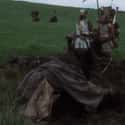-
(#1) Power Shouldn't Derive From A Woman In A Lake Who Hands Out Sabers
In Arthurian legend, Arthur receives his almighty, magical blade Excalibur from Vivienne, the Lady of the Lake. Excalibur plays multiple roles in the tales - first as the literal weapon Arthur uses to lead a valiant battle against the Saxons, and then as a symbol of his virtue and power as he leads the people of Briton in a just and valiant manner.
Some people, including Arthur himself, claim his power as king derives from the blade bestowed upon him. He was chosen for the role, as kings from the late medieval and early modern eras were legitimized by divine right. But where should power really derive from?
According to Dennis, the 37-year-old peasant whom Arthur mistakes for an old woman, "Strange women lying in ponds distributing swords is no basis for a system of government," but instead, "[s]upreme executive power derives from a mandate from the masses..." Now, it's questionable whether the anarcho-syndicalist commune he suggests is any better than the monarchist tyranny he's so adamantly against, but Dennis makes a good point: "You can't expect to wield supreme executive power just 'cause some watery tart threw a sword at you."
Anyone else claiming the same would probably be written off as crazy.
-
(#2) Storming A Castle To Save Someone Isn't Necessarily Heroic
What's more heroic than a gallant knight storming a castle to save a damsel in distress from her captors? According to Monty Python, just about anything else. "The Tale of Sir Lancelot" upends this common trope, suggesting that maybe it's not nearly as heroic as lore suggests.
After Sir Lancelot reads a note fastened to an arrow that struck his squire in the chest, the brave knight runs toward the nearby castle to save what he presumes to be an entrapped princess forced into marriage by her father. He storms the gates, slays the guards, and strikes down the castle's inhabitants... only to find that his princess is actually a pallid young man who would rather sing than rule a kingdom.
His dashed expectations put the entire situation into perspective: He has slaughtered a bunch of innocent people for no particularly good reason. When his tale is over, Sir Lancelot gets nothing out of it. He has no princess, no heroics, and - since his squire survives the arrow - no story of sacrifice and vengeance. Even his "dramatic" escape is ruined, as he's left dangling on a rope above a wedding party that has broken out into song and dance.
-
(#3) European Swallows Don't Carry Coconuts To England
The airspeed velocity of an unladen swallow is one of those things you need to know when you're a king, especially when you rely on them as your source of coconuts. The two castle guards King Arthur meets during the film's opening scene make it abundantly clear, however, that a 5-ounce European swallow would be unable to carry a coconut from the tropics to the temperate climate of England. Of course, African swallows may be able to, but they're non-migratory.
Regardless of the animal transporting coconuts across the world, it's obvious the conversation leaves a lasting impression on King Arthur. When asked, "What is the airspeed velocity of an unladen swallow?" near the end of the film, Arthur is able to trick the old man from Scene 24 into admitting he doesn't know which breed of swallow he's asking about. The old man is thrown into the gorge below, hoisted with his own inquisitive petard.
Arthur never answers the airspeed velocity question, but some dilligent fans have made estimates. In his personal blog, writer Jonathan Corum estimated that a European swallow has the airspeed velocity of 11 m/s (24 mph). Would such a small bird, flying at that speed, be able to carry a coconut across continents? The answer is unclear - and ultimately pointless, since Camelot's Master of Science Sir Bedivere shows us that doves transport coconuts, not swallows.
-
(#4) A Trojan Horse-Like Trap Is A Ridiculous Military Tactic
The French, King Arthur's greatest adversary, are not to be trifled with. They taunt the English knights, deny them a place to stay, and fire livestock at them. Though Arthur and the Knights of the Round Table make a temporary retreat after the French "fetchez la vache," Sir Bedivere comes up with a cunning plan: Copy the Greeks.
After some extremely audible construction with power tools, the squires wheel up a giant wooden rabbit to the French castle. After a bit of conversation and obvious confusion among the French guards, they bring the "Trojan" rabbit into the keep - setting the stage for Launcelot, Gallahad, and Bedivere to leap out of the rabbit at nightfall and take the French totally by surprise. The plan may have worked - if only the three knights were actually in the wooden rabbit.
Ultimately, the plan wasn't so cunning after all, not only because the knights weren't in the rabbit, but also because it was strategically terrible. It may have worked for the Greeks in the semi-mythological story of The Iliad, but realistically, if a besieging army leaves a giant wooden figure at the enemy's doorstep, it's foolish for any army to completely trust it without any scrutiny. Though the French guards may be "strange" people, they aren't fools. And like the cow before it, they immediately catapult the rabbit back at the English knights.
-
(#5) Despite 85% Of The Population Being Peasants, Arthurian Legend Makes Them Seem Like A Minority
According to the British Library, 85% of all people in medieval Europe were peasants, but - as pointed out by Monty Python - Arthurian legend leads many to think the vast majority of people in the Middle Ages (or at least those who were important) were knights and nobles. Peasants in Monty Python and the Holy Grail are rarely mentioned; those who do appear are minor to the plot, incredibly stupid, and disgusting. Some wallow in the muck, others propose to make a bridge out of someone to prove they are made of wood and thus a witch, and one is even shown in the background of a scene smashing a cat against a wall.
In Arthurian legend, peasants are a passive collective, and Monty Python takes that to its logical extreme. There is only one named peasant - Dennis. But he, unlike every other peasant, stands up against the repression of the system. And though most of his spiel is an anachronistic Marxist criticism on the medieval political system, it also points out that the same repressed class is repressed in countless stories and legends told about the time period.
-
(#6) The Kingdom Of Camelot Would Not Have Been Pristine, But A Rather A Disgusting Cesspit Of Filth
When pop culture presents medieval kings, queens, knights, and nobility, they are typically romanticized and made to look clean and pristine. The Monty Python troupe leads the way in upending that unrealistic image. Peasants in the film live their lives amid dirt, disease, and squalor; knights are covered in either their own blood or someone else's. Not even King Arthur himself can keep a clean veneer as the French dump feces on him late in the film.
Medieval European hygiene was minimal. Despite people often washing their hands and faces, full-body bathing was uncommon, soap was only rarely used, and people cleaned their teeth with twigs. Yes, they cleaned themselves to the best of their abilities, but because there was rarely running water, nor any expectations to stay clean like in Byzantium or the Arabic empire, there would have been no way medieval Europeans would have stayed completely unsullied by dirt and bodily fluids.
Monty Python blatantly points this out during the "Bring out your dead" scene when King Arthur gallops by a collector and his cart full of cadavers. "[He] must be a king," the collector tells a fellow peasant.
"Why?" the peasant responds.
"He hasn't got sh*t all over him."
-
(#7) Passions Of A Crowd Can Often Overshadow Any Logic, Especially During A Witch Hunt
When a whole village of peasants is screaming, "A witch! Burn her!" - convinced they need to rid their village of her - it can be hard for anyone to resist getting caught up in the excitement. Monty Python deftly points out that - even in the face of ridiculous logic and a lack of any definitive evidence - the power of the crowd can be hard to resist.
During one of Monty Python and the Holy Grail's early scenes, a village dresses up a woman in a funnel hat and a carrot nose in order to convince Sir Bedivere that she's a witch, and must therefore be burned. Bedivere, brilliant as he is, is not easily convinced by their demands and accusations. For starters, it's obvious that one of the peasants wasn't, in fact, turned into a newt, despite his claim to the contrary. So, Bedivere devises a logical formula: Wood burns. Witches burn because they are made of wood. Wood floats. Ducks also float. Therefore: "If she weighs the same as a duck, she's made of wood... A witch!"
If you follow the logical reasoning, as some academics have, the rationale itself is obviously unsound, but that doesn't seem to bother anyone. Nor does the fact that the two sides of Bedivere's scales are obviously not evenly weighed. With no idea as to why the woman was accused, and lacking any hard evidence, everyone is swept up by the hysteria and condemns her.
-
(#8) If Faced By A Three-Headed Giant, Run Away
In "The Tale of Sir Robin," Sir Robin the Not-Quite-So-Brave-as-Sir-Lancelot is faced with what may be the most perilous of perils. Despite many signs telling the not-so-brave knight to turn away - not to mention the carcasses of three other knights pinned to a tree by a lance - Robin and his group of minstrels gallop directly into the path of a three-headed giant. Robin tries to talk his way out of the situation, but his minstrels antagonize the giant - and Robin, incidentally - by declaring Robin's (nonexistent) bravery in song. Sir Robin is faced with a confrontation so common in historical legends and stories: He must fight a monster terrorizing the countryside.
But why would he do that? Everyone who has come before him was slain by the giant's hand, there's a multitude of signs warning that the same will happen to any traveler, and he was just threatened by that very giant. He has two options: to stand and fight, or run away. If he fights, chances are he will perish just like everyone else. He takes the smarter option.
Sir Robin may be called a coward for doing so, but Monty Python is merely underscoring how absurd this common tale of "heroism" really is.
-
(#9) Being Accompanied By Singing Minstrels Would Be Infuriating
Sir Robin's minstrels are some of the most irritating people to accompany the Knights of the Round Table. They incessantly sing about Sir Robin's accomplishments (but more often failures) while following the knight's every gallop, not even ceasing in the face of imminent danger. Though they're played for laughs, their inclusion serves as a commentary on bards from medieval legends and stories - specifically Taliesin, the great bard of Arthurian legend.
Taliesin was said to have sung in the courts of three kings, prophesied the passing of the evil king Maelgwn Gwynedd, and encouraged the Celtic Britons to fight against Saxon invaders. No matter how incredible a bard may be in his chosen line of work, it would no doubt be irritating to have someone creating songs about every single thing you do.
In the case of Monty Python and the Holy Grail, those minstrels do get annoying for the entire party, and are eaten when the knights struggle for food - "There was much rejoicing."
-
(#10) Anyone Who Could 'Summon Up Fire Without Flint Or Tinder' Would Gratuitously Use Their Powers
When we're first introduced to Tim the Enchanter, he's standing on top of a hill, setting fire to every rock, shrub, and furry little critter around. When he teleports from the distant hilltop to the hill Arthur and his knights are occupying, he continues to conflagrate anything in sight, creating two little explosions right next to him without even turning around to talk to his visitors. He is Tim the Enchanter, he can summon up fire without flint or tinder, and he will do so simply because he can.
Tim is magical, and though he may be a satirical take on Merlin from Arthurian legend, the Monty Python crew were right to point out that anyone with those abilities would no doubt use them ad nauseam. Sure, maybe you wouldn't combust a bear, but wouldn't you launch fire or fireworks out of a staff, or blow up a tree if you could? Of course you would.
-
(#11) Don't Take Things Too Seriously
From the very beginning, the film sets a tone that reminds viewers not to take anything too seriously - not even the movie they're currently watching. Accompanying the grandiose music and seemingly traditional opening credits are Swedish subtitles that appear serious at first, before quickly devolving ino a story about a moose biting the subtitlist's sister after she tried to carve her initials into it with the sharpened end of a broken toothbrush. Though the problem is resolved when everyone responsible for the subtitles is sacked, everyone who is responsible for sacking those responsible for the subtitles is subsequently sacked, and everyone from the firm hired to make the credits after the sackings has also been sacked, the credit sequence continues in an epilepsy-inducing series of title cards about llamas.
There is nothing in the movie - nor Arthurian legend, nor history itself - that you should take seriously. The Python troupe makes it clear to the audience that they will make fun of everything that makes up the foundation of what they're satirizing, even the medium of film itself.
The knights know about the old man from Scene 24? A knight cuts down a modern-day historian discussion, on camera, of the legend presented in the film? The animator suffers a heart attack, thus ending the Black Beast of Aaaaargghh? An army of English knights are arrested - by local, 20th-century police, no less - before they can make their final charge on the Castle of Aaargh?
Sure, why not?
New Random Displays Display All By Ranking
About This Tool
Have you watched the old British comedy film Monty Python and the Holy Grail? The film was released in 1975 and based on the legend of King Arthur in the Medieval, telling the story of King Arthur and the Round Table Warriors accepting the will of God to find the legend of the Holy Grail. The exquisite scenes and props that fit the historical description have won unanimous praise from critics and audiences.
This great movie worth more attention, don't miss it if you have a chance to watch it. The random tool has generated 11 items, there are some surprisingly astute lessons that people can learn from Monty Python and the Holy Grail.
Our data comes from Ranker, If you want to participate in the ranking of items displayed on this page, please click here.





















